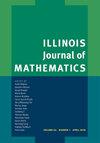幂次循环行列式
IF 0.7
Q3 MATHEMATICS
引用次数: 4
摘要
Newman证明了对于素数$p\geq 5$,一个素数幂次的积分循环行列式$p^t$不能取值$p^{t+1}$,一旦$t\geq 2.$,我们证明了许多其他值也被排除在外。特别地,我们表明$p^{2t}$是对于任何$t\geq 3$, $p\geq 3.$获得的$p$的最小幂。我们通过给出$25\times 25$和$27\times 27$积分循环行列式的完整描述来证明所涉及的复杂性。前一种情况涉及将$1\bmod5$的素数划分为两个集合,Tanner的\textit{perisads}和\textit{artiads},后来由E. Lehmer描述。本文章由计算机程序翻译,如有差异,请以英文原文为准。
Prime power order circulant determinants
Newman showed that for primes $p\geq 5$ an integral circulant determinant of prime power order $p^t$ cannot take the value $p^{t+1}$ once $t\geq 2.$ We show that many other values are also excluded. In particular, we show that $p^{2t}$ is the smallest power of $p$ attained for any $t\geq 3$, $p\geq 3.$ We demonstrate the complexity involved by giving a complete description of the $25\times 25$ and $27\times 27$ integral circulant determinants. The former case involves a partition of the primes that are $1\bmod5$ into two sets, Tanner's \textit{perissads} and \textit{artiads}, which were later characterized by E. Lehmer.
求助全文
通过发布文献求助,成功后即可免费获取论文全文。
去求助
来源期刊
CiteScore
0.90
自引率
0.00%
发文量
18
期刊介绍:
IJM strives to publish high quality research papers in all areas of mainstream mathematics that are of interest to a substantial number of its readers.
IJM is published by Duke University Press on behalf of the Department of Mathematics at the University of Illinois at Urbana-Champaign.

 求助内容:
求助内容: 应助结果提醒方式:
应助结果提醒方式:


